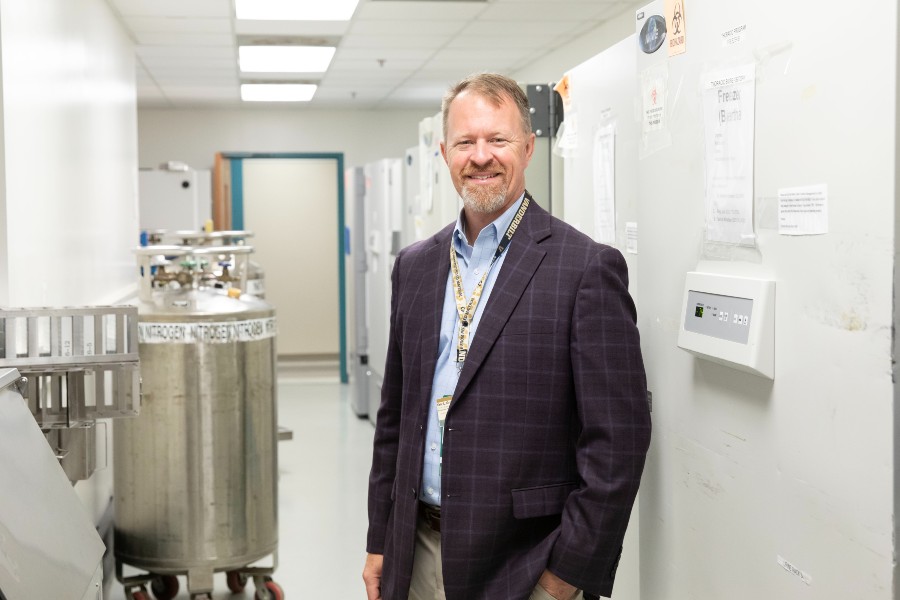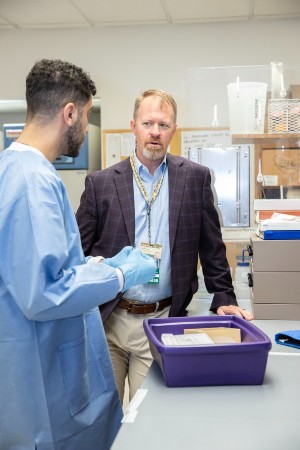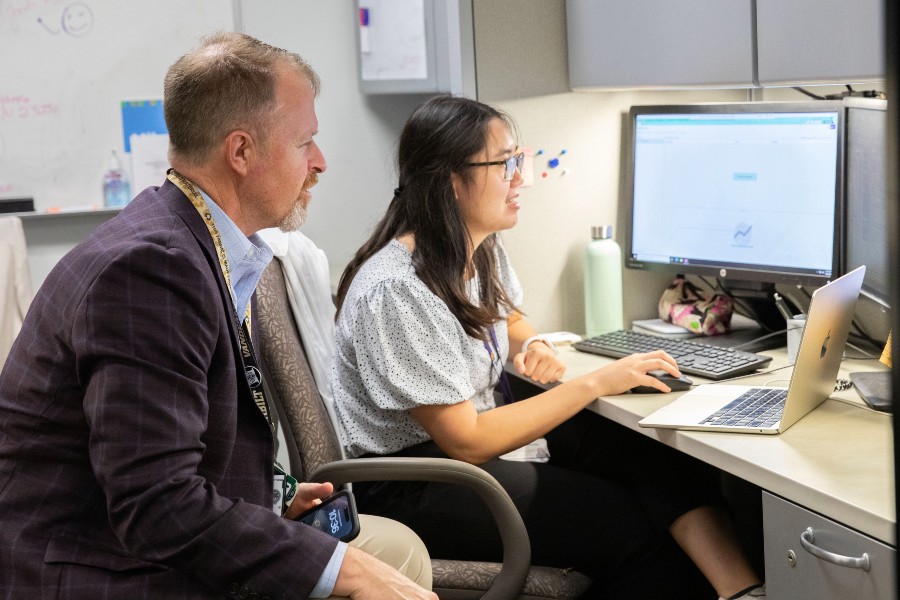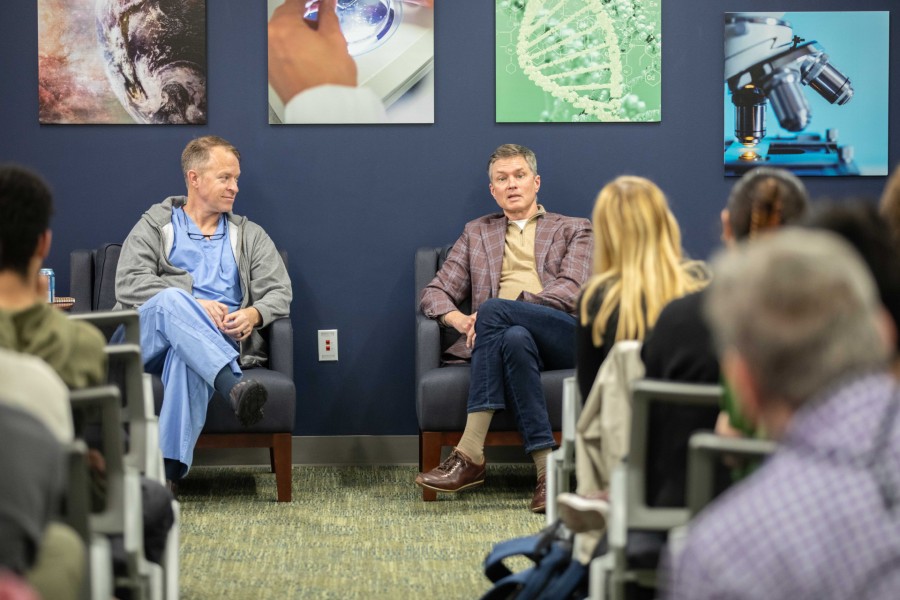Healing cancer now. Preventing cancer in the future.
Dr. Eric Grogan is working for a better future for lung cancer patients, and training Lipscomb students and alumni to carry on the journey.
Janel Shoun-Smith | 615-966-7078 |

Dr. Eric Grogan pictured in the lab’s bio bank, a repository of frozen blood and tissue samples from hundreds of lung cancer patients, to be used to develop easier diagnosis and treatment.
When Dr. Eric Grogan (BS ’95), sees Lipscomb alumnus Timothy Khalil (BA ’23) in the hallway outside the thoracic surgical suite at Vanderbilt University Medical Center, he immediately knows what that means.
Khalil, one of the clinical/translational research coordinators in the MASLAB at the Vanderbilt-Ingram Cancer Center, is on his way to pick up another specimen for the lab’s biobank. The specimen is one more piece of the puzzle that one day may lead to an earlier and less invasive detection method for the most common cancer in the world: lung cancer.
Khalil is headed to the surgery room to collect blood and tissue from the latest lung cancer patient who has consented to allow the MASLAB to study and keep their specimens and medical history on file in the lab’s biorepository, a biobank that goes back 20 years and is well-funded to continue for years into the future.

Alumnus Timothy Khalil (BS ’23) works full-time in Grogan’s lab, the MASLAB at the Vanderbilt-Ingram Cancer Center, as a clinical/translational research coordinator.
Grogan runs the lab, along with Dr. Stephen Deppen and Fabien Maldonado, as well as performing thoracic surgery on lung and esophageal cancer patients. He takes care of patients at Vanderbilt University Medical Center and the adjacent Veterans Hospital. In addition to patient care, he trains Vanderbilt general surgery and thoracic surgery residents and mentors post-doctoral research fellows, medical students and undergraduate students in research as they spend dedicated time in the MASLAB.
“Even if I don’t solve any major problems in my lifetime, if I can just help the next generation of major scientists to be able to solve them, for me, that is worth it,” said Grogan, associate professor of surgery and vice chair of research at the Vanderbilt University Medical Center’s Department of Thoracic Surgery.
Since 2016, he has hosted Lipscomb’s J.S. Ward Society Research Fellows and other Lipscomb student interns in the lab during the summer. Alumni Chandler Montgomery (BS ’17), Jerod Crockett (BS ’20), Shelbi Sullivan (BS ’20), Heath Bridges (LA ’15, BS ’19, MPAS ’21) Lucas Dormberg (BS ’22), Jacob Richardson (BS ’22) and Kahlil have all spent time in the lab to learn the skills needed to conduct their own clinical research or practice medicine in the future.
This summer, senior Carolyn Tran, a molecular biology major from Nashville and a two-time Ward research fellow, is working in the lab. Lipscomb alumnus Sam Fischer (MS ’22) is a current medical student at the University of Tennessee and is doing a research elective with the MASLAB.

Molecular biology senior Carolyn Tran worked with Dr. Eric Grogan this summer on a database of medical histories from more than 600 patients at Ingram-Vanderbilt Cancer Center.
Growing up in Paducah, Kentucky, Grogan’s father was a doctor, and he knew pretty early in life that he wanted to take the same route. When he started his education, he was planning to go back to be a surgeon with his father in Paducah, and a strong foundational education provided by Lipscomb professors Paul Langford, Oliver Yates (BA ’56), Kent Clinger, Linda Roberson, Phil Choate (BA ’69) and Jon Lowrance (BS ’77) sent him to medical school at Vanderbilt University well-prepared, he said.
But then he discovered research during medical school at Vanderbilt. He stayed at Vanderbilt to do his five-year general surgery residency and two additional years of research training as well as earning a Master of Public Health from Vanderbilt. After he finished at Vanderbilt, he spent two years completing a thoracic surgery fellowship at the University of Virginia, where he focused on minimally invasive techniques to surgically treat lung cancer.
Lung cancer is the number one cancer killer in the world and does not have a blood test that is routinely used as a biomarker to confirm its presence in the body, said Grogan. Lung cancer can be caused by more than five different cell types, and it is difficult to find one blood test to recognize all those biomarkers, he said.

Eric Grogan and Lucas Domberg
Therefore, today’s doctors can only choose to either watch the patient’s progress through imaging, which could allow potential cancer to grow, or to send them for an invasive biopsy, which risks harming the patient who may not have cancer.
Grogan’s team in the MASLAB, named after the lab’s founder Pierre Massion who mentored Grogan and Deppen and passed away suddenly in 2001, is working to develop a full panel of blood tests to help with early diagnosis without surgery, but first they must identify those biomarkers. That takes a lot of data, which the MASLAB team is collecting, cataloging and storing in freezers every day.
Richardson, who now works at the MASLAB, explains the program to patients to obtain their consent to harvest bio data and specimens. Another team member collects and catalogs all the blood, taken before and after surgery, and tissue specimens so they can be found again in the freezers.
Part of Grogan’s job is to secure grant money to keep the lab running and developing its own research, but the lab also provides specimens to industry and other researchers to test potential new blood tests.
Over the years, Lipscomb students have helped on all the pieces of the process. This summer, Tran’s job is to confirm and catalog all the clinical histories of the patients who have donated specimens.
In her first time doing clinical research, Tran is spending the summer working on a database, documenting characteristics of lung nodules from 600 patients. Through the Ward Society opportunities such as the summer fellowship, Tran has “been able to get a broader insight into different specialties and understand why each mentor wanted to practice in their respective fields,” she said.

One of the new Ward programs established in the past few years is the physician-in-residence lecture series. Here Dr. Eric Grogan and Dr. James Loden, owner of Loden Vision Centers, and both alumni, speak to students in the McClure Center.
Using all the clinical data and specimens, the team is working to develop what Grogan calls a “clinical calculator” that physicians of the future can use to measure the percentage chance of a patient having lung cancer, to thus make a more informed decision about whether to go into surgery or not. Another member of the team is analyzing all the data to create a more accurate assessment of whether the lung cancer may recur after surgery.
“We’re trying to bring discovery back to the bedside,” said Grogan.
“I never planned on doing any of this,” said Grogan. “I just kept praying that God would use all the skills and talents he gave me, and he brought me this job that involves patient care, research and educating others.
“My role to give back is to improve the lives of patients in the clinic, to research and to help those I train to improve their skills and help their future patients,” he said. “That is the foundation that Lipscomb gave me through the people who trained me and are training the next generation.”